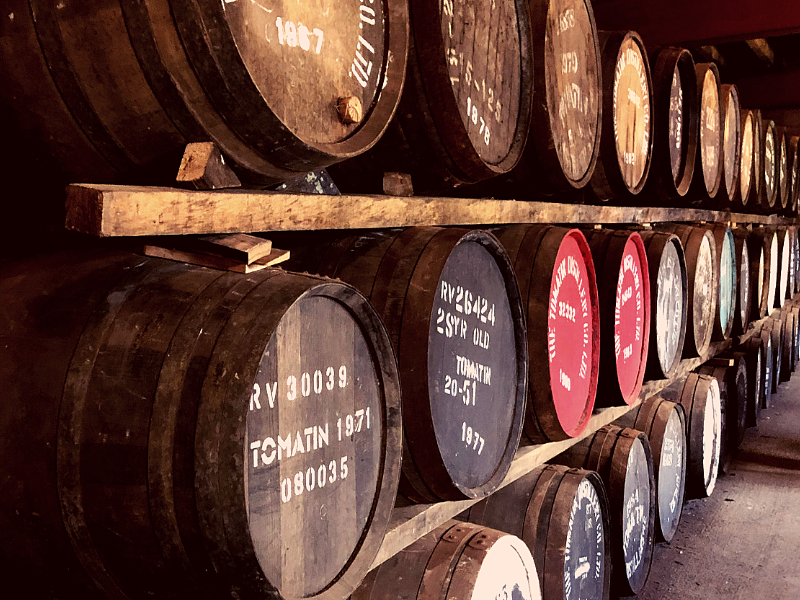WHISKY – LIQUID GOLD?
TODAY’S BLOG
WHISKY – LIQUID GOLD?
I had the great pleasure of a short break in the Scottish Highlands in May this year. We stayed near Inverness, at a delightful B&B very close to the small village of Drumnadrochit. We had a fantastic view of Loch Ness, though given that I am something of a sceptic, didn’t venture into any of the monster museums.
Anyone that has been to the Highlands knows that the scenery is utterly fabulous. Huge wide open spaces, big skies, much like America. A part of our trip included visiting a friend who has set up a Whisky Bar in the distillery capital of Scotland – Dufftown. The Seven Stills has a wonderful little restaurant and vast supply of whiskys, do call in and say I sent you.
Anyway, I saw a piece on the news about a fire at a Jim Beam warehouse in the US. This reminded me of a tour around one of the distilleries we visited (well, it would be rude not to do so). The tour was interesting and by the end of the tour our guide was highlighting the merits of investing in whisky. There are huge prices being paid for whisky. Serious money snaps up “new” products (for which read, distilled and laid down about 50 years ago) and now decanted into bottles.

Water to Whisky
I’m sure that for some there is money to be made in whisky, but not for most. Investing always comes with costs, these are explained and shown on your statements. The format has improved, but they are nothing short of useless in terms of explaining value. Stating the price of something is one way of showing a value, but.. whisky is designed to be consumed. Basic economics of supply and demand will inevitably mean that price rises with scarcity.
Angel’s Share
There are storage, security, insurance and maintenance costs incurred by a distillery for many years. The distillery I visited was holding a few barrels (casks) certainly as far back as 1967. A typical cask holds about 200 litres. The casks themselves are second-hand and from around the world, (typically Spain, Portugal and America) depending on the desired result would be changed to provide a different flavour to the whisky. Most casks last for up to 60 years. They leak and have to be fixed by a trained Cooper (there is a 5-year training process). The whisky evaporates and tends to lose 2% a year of its alcohol by volume every year! The distillers call this “The Angel’s Share”. I might call it an annual cost of 2%.
When a bottle finally goes on sale for a price of say £40 in most cases it has been in production for 12 years. The longer the production, the more expensive. To sell your cask (if you had bought one) from 1969 you are essentially selling something that has taken 50 years to produce, 5 decades of patience and “leaving well alone”. There have been 50 years of costs and inflation. This fact alone leads to the conclusion that there would be a very limited supply. Hence the £5,000 price tag for a bottle of 1969 Glenfarclas Family Cask S16, 2451. Yes, this is subjective to collector opinion. A 1999 “similar” bottle would be £265 for a 20-year-old bottle (new by comparison).
Inflation and intoxication
If we could have bought the bottle of 1969 Glenfarclas for £40 in 1969 today it would now cost £641.92 purely due to inflation over 50 years. So whilst this goes some way to explaining a £5,000 price tag, it is obviously only part of the story… the rest is in the perceived value, restraint and costs over 5 decades. In many senses there is also the survivor and success premium – of lasting the distance. You are only able to purchase what has survived. In the same way that you can buy shares in Shell but not Barings.
Leave it alone – stay off the good stuff?
If you are going to buy “alternatives” or “collectables” you basically have to leave them alone and wait for the impact of inflation, scarcity and perceived value. This might sound easy, but the temptation not to drink or consume your investment is fairly great in this instance. It is hard enough to persuade investors in mainstream investments to leave their portfolio alone each year, but for 5 decades? Even the Angels take something each year…
As for the fire at Jim Beam, it would seem that they lost 45,000 casks in the fire. This may have some impact on the price of casks sold to whisky producers around the world (in America the cask cannot be reused). It will also greatly increase the price of any surviving casks, but otherwise, I do hope they were insured against fire.
Dominic Thomas
Solomons IFA
You can read more articles about Pensions, Wealth Management, Retirement, Investments, Financial Planning and Estate Planning on my blog which gets updated every week. If you would like to talk to me about your personal wealth planning and how we can make you stay wealthier for longer then please get in touch by calling 08000 736 273 or email info@solomonsifa.co.uk

GET IN TOUCH
Solomon’s Independent Financial Advisers
The Old Bakery, 2D Edna Road, Raynes Park, London, SW20 8BT
Email – info@solomonsifa.co.uk
Call – 020 8542 8084

GET IN TOUCH
Solomon’s Independent Financial Advisers
The Old Bakery, 2D Edna Road, Raynes Park, London, SW20 8BT
Email – info@solomonsifa.co.uk Call – 020 8542 8084


